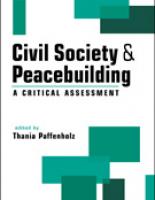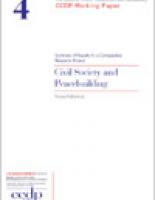project description
Since the 1990s, civil society has been assumed to be an important actor in peace processes, enjoying generous support from donors and international NGOs. However, civil society is not a uniform actor and can take up different roles in different phases of peace processes. These roles can be in support of, but also against, peace processes. For example, the civil society mass movement in Nepal pushed for the end of the war; civil society groups in Kenya, Guatemala and Afghanistan managed to put important issues onto the negotiation agenda. However, civil society mirrors divergent views in society, and may not necessarily be in support of a given peace process as seen in Sri Lanka where Buddhist Monks demonstrated against the peace negotiations, and in Cyprus where many civil society groups opposed Kofi Annan’s proposed peace plan.




